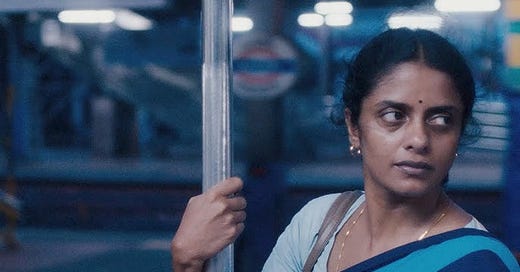A Woman’s Freedom
In Payal Kapadia’s “All We Imagine as Light,” freedom is the ultimate desire. And Mumbai, the lover that promises it all.
Lovers are used to interruption. A family member’s disapproval, an unexpected war, an avoidable misunderstanding — very rarely are lovers allowed the full breadth of their declaration to their beloved. In Payal Kapadia’s “All We Imagine as Light,” a proposal is made under a monsoon sky. There’s a pause. The woman asks for permission to leave. You see hesitation in her eyes. You think you’ll see desire next. Instead she says, “I should go, I will miss my train.” In Mumbai, even the rhythms of love follow the train timetable. You can be confused about your feelings. But you better not miss your train.
As far as cinematic cities go, there are few competitors to a city like Mumbai — whichever you name you call it by. It’s why it has been a committed muse to many filmmakers. But Kapadia’s gaze on this “city of illusions” centres the desire the city evokes in the women that live in it.
The desire to be free.
And so in Kapadia’s Mumbai, the anonymity that chaos brings is, ultimately, freedom.
You see the city — drenched in all shades of monsoon blue, a sea of crowds, something always happening at the margins. But its women are given space to fully be themselves — in corners of local trains, lit up by a cityscape while reading poems, in hospital kitchens where wise counsel is given undisturbed.
An unnamed speaker in the film talks of how the city took care of her after a bad break up. A young nurse, Anu (Divya Prabha) sends her lover kisses through the rain clouds and wonders if she can ever move back to her village. Her older friend, Parvaty (Chhaya Kadam) curses those who threw her out of her city and asks if her home was ever a real place. And Prabha (Kani Kusruti), the intended-beloved in the first paragraph and a character I will never forget, uses her melancholy to build a world of her own. I live in Mumbai. And yet, by the end of the film I wanted to transport myself into wherever Kapadia’s city is.
Kapadia makes us believe that in this city — this city where you can’t complain only dream — every person holds a world of their own. And these worlds are bound together not by a shared language or by being in the same generation, but something else altogether. Friendship, love, belonging, solidarity.
This film’s magic is that it gives us a peek into these worlds of desire and loneliness to ask us — what ultimately is freedom and who has it?
The film tries to answer that question in a scene which is ironically set away from Mumbai.
Crowded cities promise freedom but no privacy. And so, Anu and her lover plan a rendezvous in a village far away. They are in a cave looking at graffiti from lovers past which are variations of “X loves Y,” until the torch shows Anu the word “Azaadi” written in Devanagari.
She catches her breath. And through the screen, sitting in the audience, so do I.
I don’t speak Malayalam, I am not a filmmaker, and I live a life far away from that of a young nurse. But, I know that look.
I know that look well. And I’d wager it’s a look that many women know intimately, think about daily, and wonder about often.
In a film filled with desires of all kinds, the fiercest longing of them all belongs to a word.
Desire is a freedom-shaped word.
I wrote this after catching a Saturday morning show of “All We Imagine As Light.” If that’s not an endorsement for you to catch the film in a theatre near you, I don’t know what is. Thank you as always for reading. I would love to hear from you, so hit “Reply” to say hi. If you liked what you read, share it with your cinephile friend. If you didn’t like it, share it with your Mumbai friend.
I’ll write again, soon.





truly here even the rhythms of love follow the train timetables oh my god so beautifully written 🥺
"Desire is a freedom-shaped word." Wow! Beautiful essay, Maanvi :)